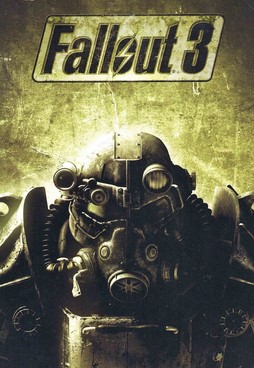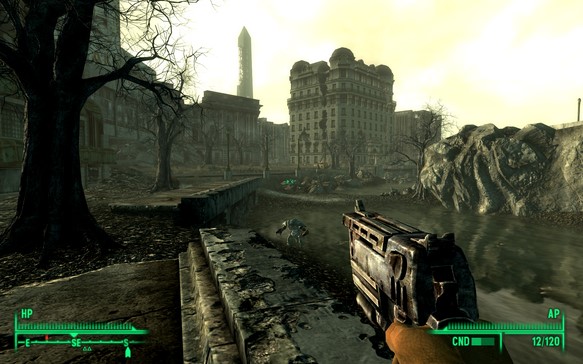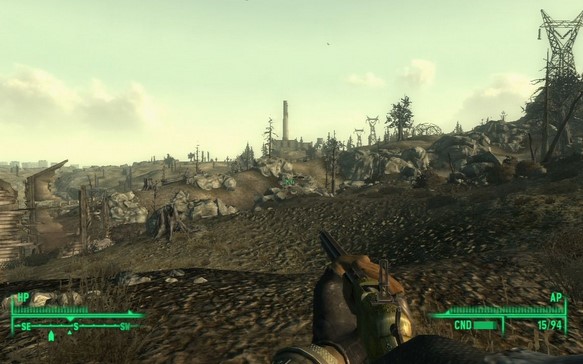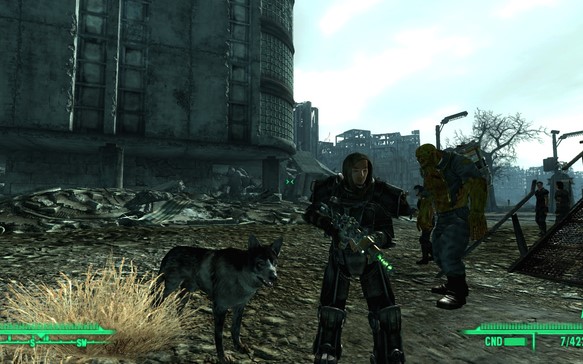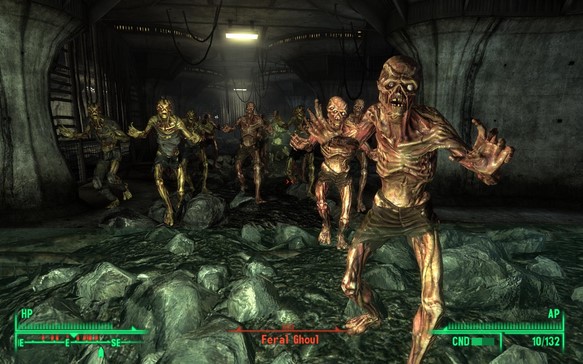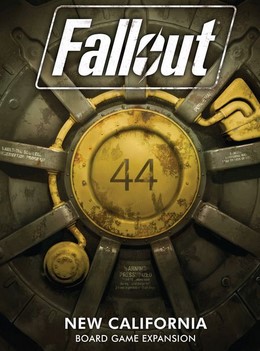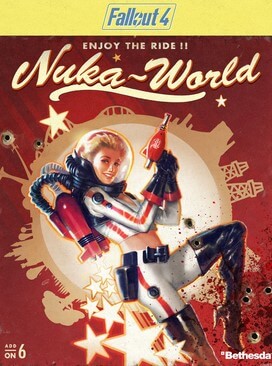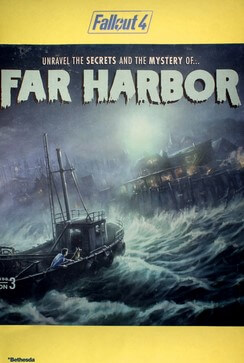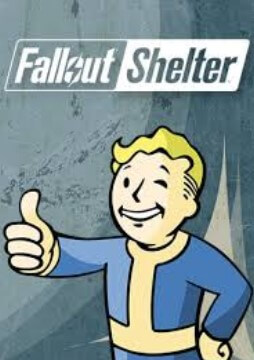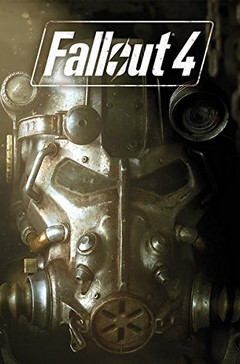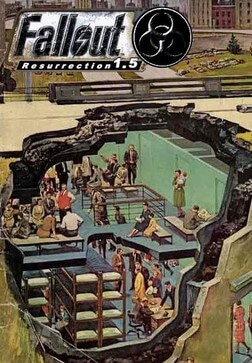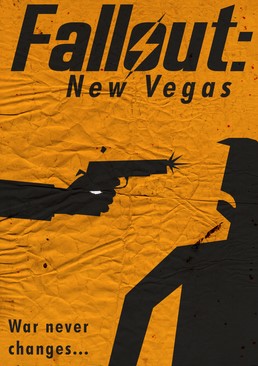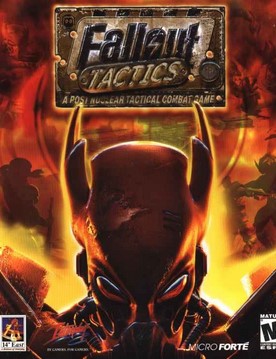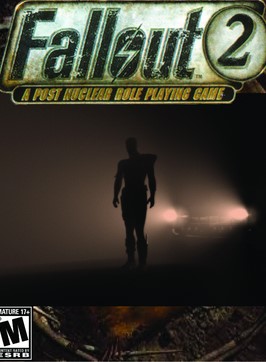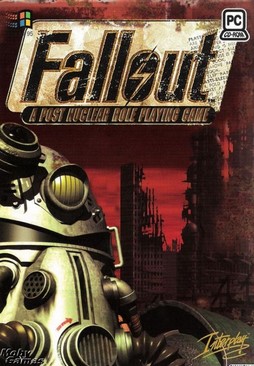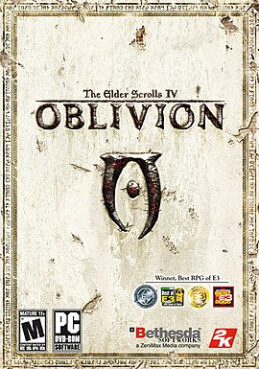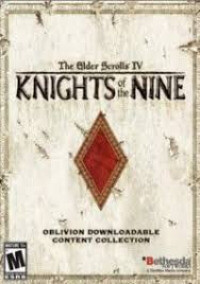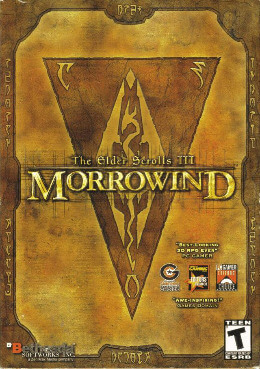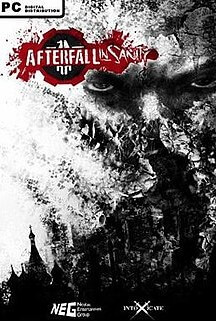Fallout 3 is a post-apocalyptic action role-playing open world video game developed by Bethesda Game Studios and published by Bethesda Softworks. The third major installment in the Fallout series, it is the first game to be created by Bethesda since it bought the franchise from Interplay Entertainment. The game marks a major shift in the series by using 3D graphics and real-time combat, replacing the 2D isometric graphics and turn-based combat of previous installments. It was released worldwide in October 2008 for Microsoft Windows, PlayStation 3, and Xbox 360.
The game is set within a post-apocalyptic, open world environment that encompasses a scaled region consisting of the ruins of Washington, D.C. and much of the countryside to the west of it, referred to as the "Capital Wasteland". It takes place within Fallout's usual setting of a world that deviated into an alternate timeline thanks to atomic age technology, which eventually led to its devastation by a nuclear apocalypse in the year 2077 (referred to as "The Great War"), caused by a major international conflict between the United States and China over natural resources and the last remaining supplies of untapped petroleum. The main story takes place in the year 2277, around 36 years after the events of Fallout 2, of which it is not a direct sequel. Players take control of an inhabitant of Vault 101, one of several underground shelters created before the Great War to protect around 1,000 humans from the nuclear fallout, who is forced to venture out into the Capital Wasteland to find their father after he disappears from the Vault under mysterious circumstances. They find themselves seeking to complete their father's work while fighting against the Enclave, the corrupt remnants of the former U.S. government that seeks to use it for their own purposes.
Fallout 3 was met with critical acclaim and received a number of Game of the Year awards, praising the game's open-ended gameplay and flexible character-leveling system, and is considered one of the best video games of all time. The NPD Group estimated that Fallout 3 sold over 610,000 units during its initial month of release in October 2008, performing better than Bethesda's previous game, The Elder Scrolls IV: Oblivion, which sold nearly 500,000 units in its first month. The game received post-launch support, with Bethesda releasing five downloadable add-ons. The game was met with controversy upon release in Australia, for the use of and the ability to be addicted to alcohol and drugs; in India, for cultural and religious sentiments over the mutated cattle in the game being called "Brahmin"; and in Japan, due to having a weapon called the "Fat Man", which releases mini nuclear bombs.
Gameplay
Fallout 3 is played from the first-person perspective, unlike previous titles of the series. The players have the option to switch between this and an "over-the-shoulder" third-person perspective at any time after the initial stages of the game. While many elements from previous titles are used, such as the SPECIAL system, and the enemies encountered, combat is played out differently, while new features are included into the series.
Character creation is done through a tutorial prologue that encompasses the different ages of the player's character, which also covers tutorials on movement, the HUD, combat, interactions with the game world, and the use of the Pip-Boy 3000. The character's creation is done in steps, with the player first setting up their appearance along with what race and gender their character is, and the name they have. Next, they customize their character's primary attributes via the S.P.E.C.I.A.L. system – Strength, Perception, Endurance, Charisma, Intelligence, Agility, and Luck – which is retained in Fallout 3, and determines the base level of the Skills the character has. Which three Skills their character focuses on can either be left to the choices they make with a series of question, or by choosing manually what they desire. Character creation is not finalized until the player leaves Vault 101 and enters the Capital Wasteland, allowing players the option to modify their character's appearance, primary attributes and Skill choices if they are not satisfied with their choices.
As the character progresses through the game, experience points (XP) are earned from accomplishing various actions, such as completing a quest, killing an enemy, and so forth, with a new level granted upon reaching the necessary amount of XP. A new level grants the player the ability to allocate points to the various Skills available and thus improve upon them, making them more effective; for instance, a higher lock-picking skill allows the player to be able to tackle more difficult locks on doors and containers, while a higher medicine skill increases the amount of health recovered with Stimpaks. Once the character achieves their second level, they can be granted a Perk, which offers advantages of varying quality and form, such as being able to carry more items, finding more ammo in containers, and having a higher chance to perform a critical hit. Many Perks have a set of prerequisites that need to be satisfied, often requiring a certain Skill level to acquire them, while a new Perk can be granted for every two levels earned by the character. Additional improvements to Skill levels can be made by finding Skill books, which confer a permanent boost to levels, while players can search for and find a series of 20 bobbleheads that confer a bonus to these and primary attributes.
An important statistic tracked by the game is Karma, which is affected by the decisions and actions the character performs during the game. Positive actions to Karma include freeing captives and helping others, while negative actions towards this include killing good characters and stealing. Actions vary in the level of karma change they cause; thus, pickpocketing produces less negative karma than the killing of a good character. Karma can have tangible effects to the player, beyond acting as flavor for the game's events, in that it can affect the ending the player gets, alter dialogue with non-player characters (NPCs) or give off unique reactions from other characters, while also granting access to certain perks that require a specific Karma level. However, the player's relationships with the game's factions are distinct, so any two groups or settlements may view the player in contrasting ways, depending on the player's conduct.
